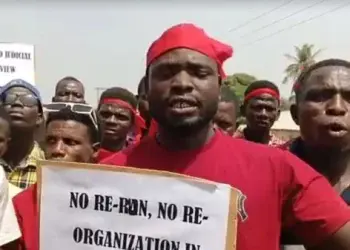The government led by the National Democratic Congress (NDC) and its decision to reconsider its decentralised Senior High School (Free SHS) food supply policy—just six months into implementation—is generating unease within educational and political circles.
The programme, which transferred food procurement responsibilities to school heads and bursars, was a central pledge in the ruling NDC manifesto aimed at revitalizing local economies and restoring accountability in the school feeding system.
However, in a surprising shift, Minister of Education Haruna Iddrisu has announced plans to review the policy.
Addressing the Presidential Press Corps in Accra, Mr. Iddrisu expressed dissatisfaction with the quality and quantity of meals being served in SHSs under the decentralized arrangement.
Minister cites food quality concerns
“It appears that at many levels, the quantities and quality of the food are just not good enough,” Mr. Iddrisu stated.
He added that while government is considering reversing the policy, up to 40% of procurement—particularly perishables—would still remain under the control of the Conference of Heads of Assisted Secondary Schools (CHASS).
The Ghana Buffer Stock Company and the Ghana Commodity Exchange, he said, would take over the procurement of grains and other staples.
“What is important is timely, quality delivery of food,” the Minister emphasized, without offering specific data or audit reports to substantiate the scope of alleged deficiencies in the system.
Policy u-turn raises political stakes
Critics of the proposed reversal argue that without empirical evidence showing widespread failure, a wholesale cancellation of the policy would be unjustified and could backfire politically.
They suggest that instead of scrapping the programme, the Ministry of Education should conduct a thorough audit, identify specific schools or officers that have fallen short, and apply targeted sanctions.
The government should isolate and address cases of mismanagement rather than punish all schools.
They warn that a blanket reversal could ignite friction between government and headteachers—many of whom welcomed the initial policy as a restoration of professional trust and autonomy.
Potential fallout for NDC ahead of 2028 elections
The broader concern for the NDC lies in the political consequences of reversing a flagship policy that resonated with educators, local food suppliers, and rural communities.
A poorly managed reversal could alienate these key constituencies and damage the party’s credibility ahead of the 2028 general elections.
If government imposes a reversal without clear justification, it risks losing goodwill it has only just begun to regain.
Calls are growing for the Ministry of Education to adopt a measured, evidence-based approach that prioritizes accountability without undermining local initiative.
For now, the future of the SHS food procurement programme hangs in the balance—along with the political stakes tied to its success or failure.












